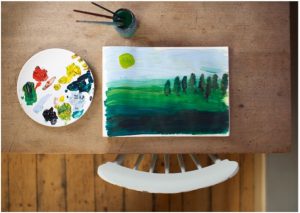
By Sarah and Joanna
One of the many perks of being an undergraduate at King’s College London is the broad range of modules to choose from. You never have to worry about struggling to find a module you enjoy. King’s has got all the bases covered, no matter how niche you may think your interests are.
Philosophy of Art
 Philosophy of Art has been one of the more niche modules I have had the pleasure of taking at King’s College London. From a young age, I have always had an interest in art. My whole family loved going to galleries and museums, ranging from paintings to traditional textiles. This module allowed me to apply philosophical topics to aspects of my life. We explored the age-old question, What is art? whilst also discussing philosophical theories from figures such as Hume and Kant all the way to Sontag and Saito. The seminar consisted of a small group of around 12 students, and we discussed illuminating topics such as laundry as art or even possible ethical issues in art. We also touched on issues of whether artificial intelligence had the capacity to produce art, and if so, what would this mean for an artist’s role in producing art? For my final essay I was able to apply Hegel’s philosophy of art onto Jackson Pollock’s No.5 painting to analyse its various aspects on what exactly makes it art. I was lucky to be able to take this module, as it was one of the most interesting ones I’ve taken.
Philosophy of Art has been one of the more niche modules I have had the pleasure of taking at King’s College London. From a young age, I have always had an interest in art. My whole family loved going to galleries and museums, ranging from paintings to traditional textiles. This module allowed me to apply philosophical topics to aspects of my life. We explored the age-old question, What is art? whilst also discussing philosophical theories from figures such as Hume and Kant all the way to Sontag and Saito. The seminar consisted of a small group of around 12 students, and we discussed illuminating topics such as laundry as art or even possible ethical issues in art. We also touched on issues of whether artificial intelligence had the capacity to produce art, and if so, what would this mean for an artist’s role in producing art? For my final essay I was able to apply Hegel’s philosophy of art onto Jackson Pollock’s No.5 painting to analyse its various aspects on what exactly makes it art. I was lucky to be able to take this module, as it was one of the most interesting ones I’ve taken.
Greek Philosophy: Plato’s Republic & Theaetetus
I am cheating here slightly as these books were studied in two separate modules but seeing as though they were structured in the same way, I thought I’d mesh them together! Prior to taking philosophy, I pretty much only knew the two big names: Plato and Aristotle. In second year, I decided to take the leap to study Plato’s Republic, famously known for his theory of forms. The module was structured in such a way that we would cover small sections of the book each week and unpack it further in the seminars. This allowed me to slowly go through the book and truly grasp the various complex arguments Plato presented. I had never enjoyed studying a philosopher as much as I did during this module, so I decided to take Plato’s Theaetetus for third year. This time, it was even better as I was able to attend my seminar on campus which allowed for a much better discussion on the various arguments presented. I loved having a book to annotate and analyse, and the structure of the module made the task much less intimidating and more enjoyable.
Women Thinkers in Antiquity and the Middle Ages
A common criticism of studying philosophers in ancient times is that they are mostly male. What is great about a module which I am currently taking is that we have been able to study female thinkers previously unknown to me. There were a few familiar names I recognised of course, but as for most of them I did not know.
Each week we study someone new, and what I appreciate about the module the most is that we examine many different accounts of the same woman by different people (usually men) writing at the time. We consider the implications of studying a woman’s thinking that has been mostly recorded by men. Additionally, we discuss whether our historical knowledge of a particular woman would be limited if not for a man’s account of her. We also discuss ho w the construction of gender at the time when the thinker was active may have constrained her thinking and philosophical thought. These aspects of this module I think, really distinguishes it from other modules that I have taken on ancient thinkers.
w the construction of gender at the time when the thinker was active may have constrained her thinking and philosophical thought. These aspects of this module I think, really distinguishes it from other modules that I have taken on ancient thinkers.
Taking this module allowed me to reflect upon how we value ancient thinkers and their thoughts. A major impact of this module is that it highlights the fact that we really need to consider how to value women’s opinions moving forward when studying the history of ‘western’ philosophy. Seeing how many women are missing from our understanding of ancient philosophers made me realise this.
This module is a collaborative effort between KCL and the LMU in Munich. It is a great opportunity to be studying a module aimed at illuminating our conception of ancient female thinkers.
Political Philosophy
As a first-year philosophy undergraduate student I found that I was required to study a broad range of modules. We took modules such as Elementary Logic and Methodology, and we also took essay-based modules such as Modern Philosophy and Greek Philosophy. I found this wide scope of modules initially overwhelming, but then I understood that our first year was really about finding out which areas of Philosophy we enjoy studying, which allowed us to specialise in our second year.
One of the best perks of being a second year Philosophy undergraduate is that I now have the chance to focus on the particular modules that I enjoy. Political Philosophy is one of them. I took the Political Philosophy module offered in semester one and the one offered in semester two in second year. Despite covering the same area of philosophy, they still contrasted greatly. In semester one, we focused primarily on the ‘social contract’, which discusses the nature of the ‘contract’ citizens have with the state or government. This occupied most of the thinking we did in the first semester. Semester two’s topics are more specialised as we discuss different topics week by week. This variation gives us the chance to choose the topic we enjoyed the most to discuss in our end-of-year exams.
The ability to continue my interest in Political Philosophy throughout the whole year helped build my confidence for the upcoming exams. What you might hear from others who do Philosophy is that doing well in a module really depends on how much you enjoy it. I won’t lie to you, Philosophy can be challenging, but KCL provides us with a great learning environment where we can work out what we are interested in makes a real difference. Assessments become a lot less stressful when you are sure of your dedication to the modules you are studying. That is why King’s is a great place to begin your journey in Philosophy.
For more information on an undergraduate in Philosophy click here.
For details on the modules available in each year of study click here.

Leave a Reply